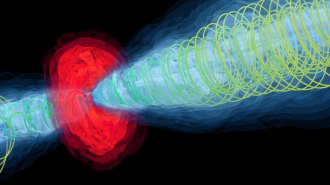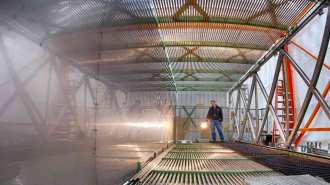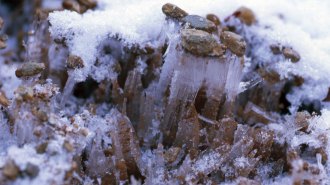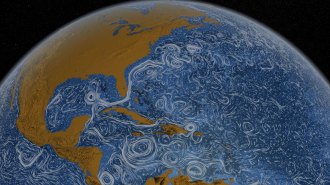Physics
Sign up for our newsletter
We summarize the week's scientific breakthroughs every Thursday.
-
 Physics
PhysicsNew high-speed video reveals the physics of a finger snap
Inspired by the infamous snap of the Avengers rival Thanos, scientists set out to investigate the physics behind finger snapping.
-
 Particle Physics
Particle PhysicsA new particle accelerator aims to unlock secrets of bizarre atomic nuclei
The Facility for Rare Isotope Beams will help scientists unlock the inner workings of atomic nuclei and explore how elements formed in the cosmos.
-
 Space
SpaceA stunning simulation re-creates how M87’s black hole launches plasma jets
Two jets, thousands of light-years long, are re-created in a computer simulation, which suggests that M87’s black hole must be spinning rapidly.
-
 Materials Science
Materials ScienceResearchers have unlocked the secret to pearls’ incredible symmetry
Understanding the structural secrets of how mollusks form symmetrical pearls could inspire more optimal materials for solar panels and space travel.
-
 Physics
PhysicsNeutron star collisions probably make more gold than other cosmic smashups
Smashups of two neutron stars produce more heavy elements than when a black hole swallows a neutron star, calculations suggest.
-
 Space
SpaceA rush to watch a supernova exposed its last gasp before exploding
By studying the final years of stars, scientists hope to find clues to help them recognize when other stars are about to blow.
-
 Materials Science
Materials ScienceLithium-ion batteries made with recycled materials can outlast newer counterparts
Batteries with recycled cathodes outperformed batteries with new cathodes, lasting for thousands more charging cycles before their capacity waned.
-
 Particle Physics
Particle PhysicsDoubt cast on theorized ‘sterile’ particles leaves a neutrino mystery unsolved
MicroBooNE weakens the case for sterile neutrinos, but the mystery that shrouded earlier neutrino experiments remains.
-
 Earth
EarthHere’s how ice needles sculpt patterns into cold, rocky landscapes
Striking stone patterns decorate remote, frigid landscapes. The recipe for these naturally forming stripes and swirls: Freeze, thaw, repeat.
By Beth Geiger -
 Physics
PhysicsHere’s the physics of why ducklings swim in a row behind their mother
By paddling in just the right spots, ducklings save energy by surfing their mom’s waves, and pass along the benefit to siblings down the line.
-
 Physics
PhysicsAn atomic clock measured how general relativity warps time across a millimeter
A record-breaking result reveals the precision achievable by atomic clocks, letting researchers detect slightly faster ticking over a tiny height change.
-
 Physics
PhysicsWork on complex systems, including Earth’s climate, wins the physics Nobel Prize
Syukuro Manabe and Klaus Hasselmann pioneered work on computer simulations of Earth’s climate. Giorgio Parisi found hidden patterns in disordered complex materials.